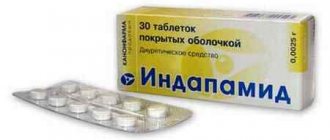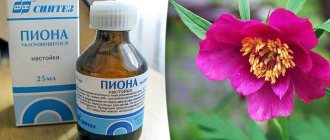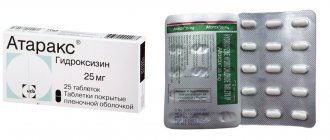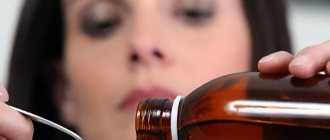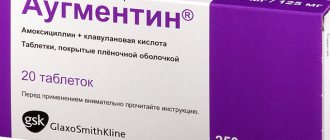In the modern rhythm of life, stressful situations often arise, and it is necessary to use sedatives. Drops from motherwort tincture are an effective remedy for relieving nervous tension, healing the body, strengthening the immune system and preventing heart disease.
Drops from motherwort tincture are an effective remedy for relieving nervous tension, healing the body, strengthening the immune system and preventing heart disease.
Prickly motherwort
What do you know about this nondescript weed? “People usually drink it to calm down,” you say. Yes, indeed, treating the nervous system is its main task, but not the only one. Today we will look at how to drink motherwort tincture and what problems its use solves.
Motherwort is a perennial plant, completely unpretentious, that grows in meadows, streets and parks. It can reach one meter in height. Dry tops are used to prepare a medicinal infusion. The product has a bitter taste and is characterized by a brown color. Let's take a closer look at what is included in its composition, as well as how to drink motherwort tincture.
Description of motherwort
Motherwort is a herbaceous perennial plant that belongs to the Lamiaceae family. It has unique medicinal properties.
Thus, with the help of five-lobed motherwort, you can lower blood pressure, and it also has a positive effect on the cardiovascular and nervous system.
In addition, the plant is capable of:
- relieve spasms and cramps;
- lower glucose, lipid and cholesterol levels;
- normalize the metabolism of carbohydrates and fats.
Motherwort acquires medicinal properties during the flowering period. The upper parts of the plant are used to make the tincture. They contain alkaloids, essential oil, cardiac glycosides, tannins and much more.
Thanks to the presence of such components, it is possible to prepare a tincture from motherwort that will have unique medicinal properties.
Compound
What is the main difficulty in prescribing medicinal herbs? The fact is that it is very difficult to correctly calculate the concentration of nutrients, and therefore the medicinal dose. Even the final result depends on the conditions in which the plant was collected. Since older people often drink motherwort tincture, an overdose of the active substance can be quite noticeable for them.
Of course, to simplify things, you can buy motherwort in tablets. It seems like everything should be exactly right here. But, unwrapping the package, we see that this is not a medicine, but a dietary supplement.
That is, the composition and most importantly - the amount of the active substance - is not checked or controlled by anyone.
But we’ll leave the topic of dietary supplements for next time. Today we are interested in how to drink motherwort tincture. And let's return to its contents. It includes:
- Bioflavonoids.
- Saponins.
- Essential oils.
- Glycoside alkaloids.
- Vitamins A and E.
- Astringent and sugary substances.
Motherwort in tincture: medicinal properties and contraindications
The main benefit of taking core tincture is the beneficial effect and stabilization of the central nervous system. The use of a herbal remedy gives a calming effect, reduces excessive excitability; it is not for nothing that motherwort tincture is an analogue of the alcoholic infusion of valerian or Corvalol. The medicine allows you to get rid of insomnia, normalizes sleep, makes it strong and uninterrupted, and does not cause drowsiness and lethargy in the morning.
The product is used for the complex treatment of various neuroses. Taking the tincture allows you to quickly get rid of symptoms: insomnia, neuralgia, spastic pain of various types. It is one of the most effective herbal remedies for VSD; it quickly eliminates the manifestations of the disease: heart rhythm disturbances, dizziness, weakness, chills, etc.
Core tincture helps to cope with premenstrual syndrome, normalize the volume of menstrual flow (with scanty periods), and stabilize the psycho-emotional state during menopause.
Motherwort tincture is used for the treatment and prevention of diseases of the heart and blood vessels (cardiosclerosis, heart rhythm disturbances, angina pectoris, myocarditis, etc.).
Special substances in motherwort tincture, such as rutin, have a beneficial effect not only on the functioning of the vascular system, but also on the normalization of blood pressure. The core contains reserpine, a substance that helps reduce blood pressure.
The presence of these two elements, essential oils and other valuable substances make it possible to use the core tincture to combat hypertension. Therefore, if you are interested in whether an alcoholic tincture of motherwort increases or decreases blood pressure, the answer is clear - it only decreases it. Therefore, hypotensive patients should not take this product.
Of course, a single dose of a herbal remedy is not capable of sharply and strongly “dropping” blood pressure, but taking the medicine will further aggravate the situation, significantly worsening the general condition of hypotension. The tincture can be drunk only with high blood pressure.
In addition, motherwort tincture is taken for the treatment of dyspeptic symptoms, ulcers of the gastrointestinal tract, relieving convulsive conditions, shortness of breath and bronchial ulcers, epileptic conditions, and paralysis.
Important! The simultaneous use of tincture of cardiac herb and synthetic painkillers, sedatives, cardiac, and antihypertensive drugs significantly enhances the effect of the latter.
Indications for use of motherwort tincture
It is recommended to take the medicine in the following cases:
- Neurasthenia;
- Vegetative-vascular dystonia;
- Mood swings from severe irritability to apathetic state;
- Insomnia and sleep disorders (sensitive, interrupted sleep, heavy dreams);
- Arterial hypertension (initial stage);
- Neuroses of various natures (cardiac, stomach, intestinal, etc.);
- Spastic pains of various localizations (pain syndrome due to neurosis): migraine, pain in internal organs, neuralgia, myalgia;
- Heart rhythm disturbances (arrhythmia, tachycardia, decreased heart rate);
- Disturbances in the psycho-emotional background during menopause;
- Menstrual irregularities (normalization of volume with scanty discharge);
- Elimination of manifestations of premenstrual syndrome;
- High blood pressure;
- Nervous conditions (increased anxiety, fear, nervousness) quickly replaced by fatigue and loss of strength;
- Chronic stress, depressive states;
- Diseases of the excretory system (used as an adjuvant in the treatment of cystitis, urethritis);
- Problems with the thyroid gland;
- Prostate adenoma, prostatitis.
Contraindications for use
Despite the rich range of medicinal properties and the use of tincture in the treatment of various diseases, the use of the product can cause serious harm to health. Therefore, it is so important to know in what cases the medicine can and cannot be used. Absolute contraindications for use are:
- The period of bearing a baby. Motherwort tincture should not be taken during pregnancy, especially in the early stages, since the remedy can provoke a miscarriage by increasing the tone and contractions of the uterus.
- Under no circumstances should you drink an alcoholic infusion of the core at low blood pressure, since the substances in its composition will further reduce its performance.
- The herbal preparation is contraindicated during heavy menstruation, since taking the medicine will increase bleeding.
- The product is not recommended for children under 12 years of age. For the same reason, nursing mothers should not drink herbal medicine.
- Any acute illness.
- Alcohol infusion of the core is contraindicated in case of alcoholism, individual intolerance and allergy to any component of the medicine.
For alcoholism or ethanol intolerance, it is recommended to take the drug in tablet form.
It is difficult to answer the question of which is better - motherwort in tablets or a herbal tincture with alcohol, since both products are equally effective. In some cases, consumers note faster results from using the tincture, but in case of ethanol intolerance or alcoholism (when an alcohol product will cause severe side effects), it is only possible to take tablets with motherwort.
You should take the medicine with caution in case of liver diseases, severe brain pathologies and traumatic brain injuries, in cases where the child is under 18 years of age.
Motherwort tincture: side effects
Taking the drug can cause a number of side effects, including:
- Allergic manifestations (rash, redness, swelling of the skin);
- Dyspeptic disorders (heaviness, nausea), in rare cases diarrhea is possible;
- General weakness, fatigue, dizziness;
- Drowsiness, significant decrease in physical activity and performance. There is a deterioration in cognitive processes (memory, thinking, concentration, etc.).
In most cases, a negative reaction to taking motherwort tincture occurs with an overdose.
Impact on the body
This composition has a good effect on the central and peripheral nervous system. It calms, relieves stress and helps with insomnia. Therefore, not only folk, but also official medicine has recognized the possibility of its use for a number of diseases. Let’s make a reservation right away: before use, you should consult a doctor, because in some cases the tincture can only act as an adjuvant. Motherwort showed high efficiency when:
- various forms of neurosis;
- dystonia of the hypertensive type;
- complex treatment of neurasthenia;
- mild form of sleep disturbance. If you can’t sleep for a long time, this is a great option;
- increased irritability. Will help you keep yourself in control;
- a tendency to increased emotional excitability, this is an excellent remedy;
- high blood pressure. A simple herbal tincture helps no worse than expensive drugs.
If one of your loved ones has decided to quit drinking or smoking, then motherwort tincture will help smooth out withdrawal symptoms. Let's talk in more detail about how to take the composition.
How to take during pregnancy
Despite the fact that the instructions indicate contraindications for taking the drug during pregnancy, many doctors prescribe them to their patients. This is especially true for a decoction prepared from this plant.
First of all, the herb and its decoction are used as a sedative. Many doctors recommend using them instead of valerian. Tea can help relieve anxiety and relieve the effects of recent stress.
So, with a reasonable approach to the use of motherwort tincture, you can significantly improve your own well-being without resorting to the use of strong medications with corresponding side effects.
We bring to your attention a video describing the medicinal properties of motherwort and a homemade recipe for preparing the tincture:
Doctors' opinion
Summarizing all of the above, it can be noted that the plant has sedative, hypotensive, antispasmodic, anticonvulsant, and tonic properties. Cardiologists often recommend that their patients take motherwort in courses. The beneficial substances contained in its composition help reduce high blood pressure. Tonic properties facilitate cardiovascular diseases, and flavonoids strengthen vascular walls. In some cases, the drug helps relieve seizures.
Use of Motherwort P for other diseases
The use of Motherwort P is not limited to diseases of the nervous and cardiovascular systems. Let's consider the effect of the main component of the drug - motherwort cardiaca - on other organs and systems of the body.
- Reproductive system. In gynecology, motherwort herb is used to normalize ovarian function, stimulate menstrual bleeding and labor (intrauterine pressure when taking motherwort increases by 41.3%), relieve pain during menstruation, correct the functioning of the endocrine system, eliminate toxicosis and postpartum depression, with fibroids, restore emotional background in the premenopausal and menopausal periods, relief from hot flashes and rapid heartbeat during menopause. (Chan WC et al. “Clinical observation on the uterotonic effect of I-mu Ts´ao (Leonurus Artemisia)”, American Journal of Clinical Medicine, 1983)
For men, Motherwort P will help normalize spermatogenesis and eliminate sexual disorders caused by psycho-emotional disorders.
- Gastrointestinal tract. Motherwort herb has a stimulating effect on the secretory function of the stomach, an analgesic effect in intestinal colic, and can normalize the process of gas formation, the level of acidity of gastric juice, and relieve discomfort in the stomach and the feeling of a lump in the throat caused by nervous overstrain.
The dietary supplement “Motherwort P” can be used in the complex treatment of diseases of stomach and duodenal ulcers, inflammatory diseases of the mucous membrane of the colon and pancreas.
- Urinary system. Motherwort cordial is an excellent diuretic. The plant contained in Motherwort P stimulates the functioning of the kidneys, promotes the removal of stones from them, and has an antiseptic, anti-inflammatory and antispasmodic effect. A study conducted in China (Bensky and Gamble, 1993) showed the high effectiveness of the use of motherwort herb in complex therapy for the treatment of glomerulonephritis (inflammation of the kidney glomeruli).
- Thyroid. Excessive production of hormones by this endocrine gland (hyperthyroidism) in almost 10% of patients is complicated by cardiac arrhythmia, since it entails an increase in the need of the heart muscle for oxygen. The use of Motherwort P in the complex therapy of this disease will allow you to control the heartbeat without directly affecting the production of thyroid hormones. Most plants of the Lamiaceae family, unlike motherwort, contain thyroid-suppressive compounds that suppress the function of the thyroid gland.
There are studies proving the anticancer activity of motherwort (Kuo-Hsiung L. et al., 1988, Nagasawa H. et al., 1990, Chinwala M. G., 2003). Some plant compounds (for example, the triterpenoid ursolic acid) can inhibit the formation of cancer cells and even cause their death (lymphocytic leukemia, lung carcinoma, breast and colon tumors). However, if the tumor is caused by pregnancy, the use of motherwort can stimulate its development.
Motherwort P can provide invaluable help for colds, being a source of natural antibiotics - phytoncides and ascorbic acid. The dietary supplement has an expectorant, diaphoretic, antioxidant, antibacterial, antiviral and anti-inflammatory effect, helps strengthen the body's defenses, eliminate toxins, and restore strength after illness.
Instructions for use
Before using the composition, be sure to consult a doctor. Only he will tell you for sure whether you can drink motherwort tincture if you are ill. After all, it is made on the basis of alcohol, so it is necessary to take it strictly according to the advice of the treating specialist.
- You should start taking it with 10 drops. If the condition does not worsen or allergic reactions occur, the dosage can be increased.
- Often, even for pregnant women, motherwort tincture is prescribed. How many drops should expectant mothers take so as not to harm the unborn baby? Usually there must be a reason for this. And even in this case, it is not recommended to exceed a dose of 20 drops twice a day, diluted in water.
- Children over 12 years old can take 20 drops, once or twice a day.
- Neurosis and the initial stage of hypertension are treated as follows. Dilute 50 drops in a glass of water. You need to drink 2-3 times a day for a month.
The duration of treatment is calculated strictly individually. Therefore, only the attending doctor can tell you how much to drink motherwort tincture. This can be either a one-time dose (for example, in case of insomnia) or a long course lasting several months.
Growing
Motherwort is by no means an ornamental plant, but due to its medicinal properties it is widely grown. The grass needs nutritious clay soil and is planted in places exposed to sunlight. When growing, do not overdo it with watering!
Step 1
The plant can be grown from seeds or seedlings. Before winter, it is good to cut the grass stem above the ground so that new seedlings appear in the spring. Plant motherwort in a sunny place, choose clay areas; it prefers neutral pH soil! It does not require watering, but grows best in nutrient-rich soil. The grass is collected during flowering, from June to September, best in the afternoon. When harvesting, cut the stem to 20 cm above the ground - it may grow back during the summer.
Step 2
To collect motherwort, choose warm, sunny weather. Dry flowering greens immediately after harvesting. The best way to dry the plant is in bunches, hung in a well-ventilated area or in the shade.
The second method of preparation is by spreading it on clean paper in one layer. In this case, you can use a shoe box lined with baking paper. Do not dry the plant in direct sunlight, it will turn black! The grass usually dries out within 3 days.
Article for you:
Black walnut tincture: what it helps with, recipes for preparation and use
Drying can be done artificially, but the temperature should not exceed 40°C. After drying, chop the plant into small pieces. Store in a closed container or paper bags. Be sure to note the collection date. After a year, the plant's effects and health benefits lose their intensity.
Therapeutic duet
To enhance the effect of motherwort on the body, several types of herbs are used. Most often it is a tincture of motherwort and valerian. How to drink such a duet? Let's figure it out. We have already examined the properties of motherwort above, now let’s talk about the second component. Valerian depresses the nervous system. Thanks to this, a person feels a decrease in tension, which is comparable to drinking alcohol. Also, when consumed, the heart rate slows down and blood vessels dilate. At the same time, the muscle tissue of the urinary and digestive systems relaxes. With long-term use, a decrease in blood pressure is observed. It is recommended to drink valerian with motherwort as follows: mix alcohol infusions in equal proportions in one bottle, take the resulting composition 10-15 drops, three times a day.
When motherwort is used together with valerian, the effect of one composition is enhanced by the second. If you have low blood pressure, it is better not to use them together to relieve stress or treat insomnia. Individually, they can also help.
Indications for use
In the Middle Ages, herbal decoction was widely used in Chinese and Tibetan medicine. At the beginning of the last century, the indications for the use of motherwort tincture were clarified, and the drug was officially included in the pharmaceutical register as a calming, sedative, also used in the treatment of heart diseases.
For treatment, both aqueous decoctions and motherwort tincture in alcohol are used to:
- improvement of weakened cardiac activity;
- fight against neuroses;
- relief from severe shortness of breath;
- normalization of the pulse when it is weak;
- achieving remission in chronic diseases of the gastrointestinal tract;
- relieving stomach spasms;
- elimination of chronic catarrh of the large intestine;
- relief of severe menopausal conditions;
- combating insomnia;
- reducing high blood pressure.
The healing properties of motherwort tincture are several times stronger than valerian. It acts faster and more effectively as a sedative on the nervous system. It has been scientifically proven that this plant gently relieves heat during fever, strengthens the immune system and promotes the disinfection and healing of wounds. Due to its wound-healing and bactericidal properties, motherwort tincture is recommended for use not only internally, but also externally.
The benefits of motherwort tincture are also known to cosmetologists. Due to the presence of tannins, the product has found its use in beauty salons: it is often used to eliminate the problem of oily hair and cleanse facial skin. Lotions made from diluted alcohol tincture help relieve inflammation, so they are recommended for acne.
When is the tincture prescribed to children?
According to established opinion, motherwort is a medicine for adults. This opinion is completely erroneous, since in a precisely adjusted dosage, treatment with motherwort tincture can effectively help children with the following conditions:
- Child hyperactivity.
- Increased nervous excitability before bedtime.
- Manifestation of panic states, frequent hysterics.
- Heart rhythm disturbances, tachycardia.
- Problems with the gastrointestinal tract, irritable bowel syndrome.
- Cramps.
- Decreased immunity after colds.
- Problems with the body's hematopoietic system.
- Hormonal mood swings in adolescence.
Pediatricians note that the effect of an alcohol preparation on children under three years of age has been little studied, and therefore motherwort tincture is not prescribed for children with alcohol, but is attributed exclusively to an aqueous preparation.
Contraindications
Contraindications for motherwort tincture are associated primarily with the pronounced sedative properties of the herb. You should take the drug with caution if you have:
- diseases of the stomach and duodenum;
- during exacerbation of gastritis;
- bradycardia;
- low blood pressure;
- individual intolerance to the component;
- on menstrual days (may cause increased blood loss);
- tendency to thrombosis and thrombophlebitis.
This herb in any form is contraindicated when driving a car or carrying out work related to situation control, since it can cause a slowdown in a person’s reaction.
Motherwort + hawthorn
Hawthorn tincture has amazing properties; it has a relaxing effect on blood vessels, which lowers blood pressure. In addition, the excitability of the heart muscle decreases, which helps prevent tachycardia and increase heart contractions.
The method of application is also quite simple. In a dark bottle you will need to mix a bottle of alcohol tincture of motherwort and hawthorn. Shake well - the product is ready. You can use it as follows:
- For insomnia, it is recommended to dilute a teaspoon in half a glass of water. Take before meals, an hour before.
- For heart problems, 30 drops morning and evening.
- For neuroses, 15 drops three times a day.
- For high blood pressure and stress – 30 drops at a time.
How long can you drink motherwort tincture? A popular question that is easy to answer. Any of the variations of medicinal tincture with motherwort is taken in courses of 30 days. You can repeat after the break.
Indications of drops from motherwort tincture
It is recommended to take the tincture for the following conditions:
- high blood pressure;
- insomnia;
- nervous excitability;
- increased anxiety;
- hysteria;
- depression;
- epilepsy;
- migraine;
- cardiovascular neuroses;
- atherosclerosis;
- inflammation of the respiratory system;
- bronchial asthma;
- decreased potency;
- hormonal disorders;
- hyperfunction of the thyroid gland;
- digestive disorders (flatulence, colic);
- pancreatitis;
- menstrual irregularities;
- menopause;
- dermatitis, rashes, injuries (externally).
Motherwort + peony
Another amazing duet that can be very useful, especially if life is full of stress. Peony has unique properties to restore good mood. Therefore, if you are now going through a difficult stage of life, accompanied by stress and anxiety, and your mood is close to depression, then a tincture of motherwort with peony tincture would be an excellent choice. How to drink this composition? There is a general recommendation - 15 drops of both per glass of water. Drink two or three times a day.
When to see a doctor
If you are treating a child for nervous breakdowns and increased excitability with motherwort, then you should know that 1-2 tantrums per month for a child aged 3 to 5 years is normal. This is how the child’s psyche “relieves” excess stress. In these situations, it is not necessary to give motherwort.
There are children with, which also affects the child’s nervous system, and Dr. Komarovsky will tell everyone about this in the next video.
In adolescence, mothers often give motherwort to their children, as the workload at school increases, and hormonal changes cause inappropriate behavior in children. If, while taking it, your teenager does not feel relief within a couple of months, if he has severe depression and depression, he needs other help, and medicinal plants are not enough. Go to the doctor.
If, after taking motherwort, the child’s symptoms intensify, he becomes even more agitated, sweating is noticeable, and slight tremor of the fingers is observed, you should immediately stop taking the drug and consult a doctor.
You will have to go to the hospital even after an allergic reaction occurs. The body usually reacts to motherwort with intestinal disorders, skin rash, and in more rare cases, lacrimation and swelling of the eyelids and nasopharynx. Further use of the drug is unacceptable.
Magnificent trio
If a combination of medicinal herbs makes it possible to enhance their effectiveness, then why not go further? Take tincture of valerian, motherwort, hawthorn. How to drink this combination remedy? You should start with a minimum amount, that is, 3 drops of each type. And it’s even easier to immediately mix them in one bottle. For 4 weeks, this remedy can be taken, gradually increasing the dosage, up to a teaspoon of the composition.
This medicinal collection has the following effects:
- Improves heart function.
- Reduces nervous excitability and anxiety.
- Improves sleep, especially when falling asleep.
- Relieves headaches and migraines.
- Provides excellent relaxation when experiencing psychological fatigue.
Application area
A unique herb that contains unique compounds of vitamins, essential oils, organic acids, alkaloids, tannins, flavonoids and mineral salts, is widely used in traditional and folk medicine, as well as homeopathy. Motherwort, instructions for use of which are discussed in the article, is used:
• in the treatment of central nervous system disorders (neuroses of various types, manifestations of insomnia, hysteria, vegetative-vascular dystonia, panic attacks, menopausal syndrome, epileptic seizures);
• in the treatment of cardiovascular diseases as a means to lower blood pressure and relieve spasms of large vessels, manifestations of tachycardia and heart rhythm disturbances, prevention of strokes and heart attacks;
• as an analgesic and diuretic;
• to remove salts and waste from the body.
Essential oils contained in the leaves and inflorescences of motherwort help bring the central nervous system into order: eliminate symptoms of chronic fatigue, agitation, irritation, insomnia, increase stress resistance, eradicate vegetative failures and panic attacks. It is difficult to overestimate the use of such a procedure as a bath with the addition of an extract of this herb, which calms an excited nervous background, improves immunity, improves mood and relieves negative thoughts. The content of rutin in the product helps restore blood circulation and strengthen the elasticity of the walls of blood vessels. The effectiveness of using motherwort for prophylactic purposes to prevent the development of angina pectoris, atherosclerosis, heart attacks and strokes has long been proven. In homeopathy it is used for complaints of heart problems, flatulence and hyperthyroidism.
Motherwort + Corvalol
This combination of medicinal infusions is also used quite often. But even more effective is the use of Corvalol in combination with valerian, motherwort and hawthorn.
- Valerian tincture has a calming effect and prevents increased blood pressure.
- Motherwort tincture exhibits a calming effect, which enhances the effect of valerian.
- Hawthorn tincture has a relaxing effect on blood vessels.
- The drug Corvalol helps normalize sleep, improve blood supply to the heart and reduce the risk of heart attack.
It is necessary to mix all four tinctures in equal proportions, and then take the mixture 20 drops twice a day. You can start with 10 drops, gradually increasing the dosage. The course of treatment is 20-30 days, after which you need to take a break.
pharmachologic effect
Alcohol tincture has the following effects:
- sedative;
- diaphoretic;
- restorative;
- diuretic;
- anticonvulsant;
- anti-inflammatory;
- cardiotonic;
- hypotensive;
- wound healing;
- diuretic;
- hemostatic.
But they appear slowly, so to achieve a therapeutic effect it is recommended to take the drug in a course.
Alcohol tincture has a sedative effect.
The calming effect is obtained by reducing the process of excitation in the central nervous system, thereby relieving irritability and increased nervousness. The drug does not have a hypnotic effect, but it facilitates the process of sleep onset without causing addiction or psychological dependence.
Thanks to the alkaloid leotine contained in the tincture, a slight dilation of blood vessels occurs, as well as relaxation of smooth muscles and relieving spasms of cerebral vessels. This helps reduce heart rate and alleviate arrhythmia.
Side effects
Since you can drink motherwort tincture for calming once or in courses, the severity of its effect may vary. However, this phenomenon is also individual, so you just have to watch your body’s reaction. The most striking symptoms of an overdose are drowsiness and thirst, nausea and belching, severe heartburn.
If you experience these symptoms, it is recommended to reconsider the dosage. Most likely it is too big for you. Or this product simply isn't right for you. If it was a complex of two or more tinctures, then try motherwort, peony or hawthorn separately. Most likely, you will find your remedy in one of them. It should be noted that the symptoms of an overdose do not require correction and go away on their own, and to speed up this process you need to drink more water.
Medicinal effects in history
Motherwort originally originated from Asia and Southeast Europe, from where it spread almost throughout the world. Most likely, this expansion occurred due to its phytotherapeutic capabilities.
What motherwort helps with has been known to people since ancient times. The plant has been used to treat heart disease or rapid heartbeat. The ancient Greeks and Romans considered it a cure for the physical and emotional symptoms of heart disease.
The herb was also highly valued for its ability to relieve symptoms of female diseases and disorders. Widely used to relieve nervous irritation due to its ability to calm the entire nervous system.
In folk medicine, motherwort is considered not only a herb for strengthening the heart, but also an important component of the first aid kit of supporters of a healthy lifestyle, helping with a number of diseases.
The most famous plant-based medicine is motherwort tincture. What does it help with and how to take it correctly? Let's get a look.
Herbal infusions
All pharmacy tinctures are made with alcohol. This ensures long-term storage. But expectant mothers, small children and people who should not drink alcohol can prepare a water tincture at home. Of course, you will need to spend a little more time, but there will be no harm to your health.
You will need 45 g of raw materials. It can be pure motherwort or its mixture with any medicinal herbs. Pour a glass of boiling water over the herb and let it sit for a couple of hours. After this, strain and squeeze. You can drink the infusion no more than five times a day, 30 minutes before meals.
Motherwort grass description, photo
Motherwort is a perennial plant, and not all of its species are medicinal. The “hearty” motherwort has always been common in Central Asia, and in recent decades it has “moved” to Europe.
An adult plant is a fairly tall bush (up to 2 meters). Dark green lobed or dissected foliage is located around tetrahedral stems, the size of the leaves decreases towards the top. Small pink-violet flowers are located on a spikelet. The brown, nut-shaped fruit has sharp teeth, with which it clings to surrounding objects.
Heart grass blooms in summer. At this time, the raw materials are collected - the entire above-ground part is suitable. It is cut off at the root and sent for further processing.
Composition of the medicine and what form it comes in
As we said, you can buy it without a prescription. This tincture is produced in liquid form, placed in a glass bottle, which can be of different sizes. It can be produced in 15 ml or in large bottles up to 50 ml. There are also options for bottles from which you can drip drops, 25 ml in size. In 100 gr. The medicine may include motherwort grass, and there is a five-lobed type of motherwort or an ordinary one, as well as additional means, the same ethyl alcohol, which takes up 70% of the medicine.
Motherwort - contraindications for use
Long-term use can cause an allergic reaction - up to complete intolerance.
Excessive consumption is signaled by:
Motherwort is harmful during pregnancy and breastfeeding.
If there is excessive depression of the nervous system, reduce the dosage or stop treatment for a week. Resume taking it in smaller doses.
Motherwort should only be taken by adults.
- Abramovich O.D., Podkolzina V.A. Phlebeurysm. Herbs that will help you avoid surgery - World of Books, 2011. - 208 p. – ISBN 978-5-486-03975-1.
- Akhmedov R.B. Plants are your friends and foes. – Ufa: Kitap, 2006. – 127 p. – ISBN 5-295-03886-6.
- Govorova E. Healing properties of vodka and wine. – Lada/Moscow, 2005. – 224 p. – ISBN 5-94832-122-3.
- Dubrovin I.I. Healing teas and infusions. – Scientific book, 2008. – 50 p. – ISBN 978-5-457-26561-5.
- Dubrovin I.I. Healing motherwort. – Altey, 2007. – 48 p. – ISBN 5-94132-799-4.
- Ivanov A.V. Golden Us and other natural healers. – Ripol-Classic, 2009. – 576 p. – ISBN 978-5-7905-3233-7.
- Melnikov I.V. Heart treatment with herbs. – Melnikov I.V., 2007. – 150 p.
- Pastushenkov L.V., Pastushenkov A.L., Pastushenkov V.L. Medicinal plants. Use in folk medicine and in everyday life. – BHV, 2012. – 432 p. – ISBN 978-5-9775-0836-0
Contraindications
The drug in any form is not recommended for use by people who suffer from low blood pressure and manifestations of bradycardia. This is due to the fact that, being a medicinal plant with a sedative effect, the drug will only intensify the symptoms and manifestations of such diseases. In addition, it is prohibited to use it in the treatment of thrombophlebitis and thrombosis. Pregnant and lactating women, small children, as well as those who plan to drive in the near future should not drink alcohol-based tincture. This rule does not apply to ordinary herbal decoctions and tablets.
Symptoms of intoxication
When a toxic dose of hawthorn tincture is ingested, symptoms of intoxication and overdose develop during the first hours . The severity of the patient's condition is determined by the amount of the drug consumed.
Clinical signs of overdose are listed below:
- Bradycardia is a slow heartbeat. In case of severe intoxication, cardiac arrest may develop and clinical death may occur.
- Nausea followed by vomiting. Vomiting can occur even when the patient’s consciousness is impaired, leading to choking on his own vomit.
- Headache, dizziness.
- Rapidly increasing general weakness, drowsiness.
- Hypotension is a drop in blood pressure.
- Impaired consciousness to the level of deep coma.
Treatment for motherwort overdose
Intensive care and hospitalization are required only in cases of severe intoxication. For mild or moderate poisoning, recovery is carried out on an outpatient basis.
Therapeutic measures during hospitalization:
- drug cleansing of the intestines and stomach;
- hemodialysis, forced diuresis and oxygen therapy;
- restoration of water and electrolyte balance by introducing a solution of glucose and sodium chloride;
- in case of severe intoxication, hemosorption and plasmapheresis are performed.
Additionally, diuretics and drugs to normalize blood pressure are prescribed.
Overdose of motherwort herb in tablets and drops
Regardless of what form caused the intoxication, the symptoms are the same. The drug in tablets begins to act a little later, after they are dissolved in the stomach, and motherwort tincture almost immediately begins to spread throughout the body.
In addition, in case of an overdose of drops, a person experiences signs of alcohol poisoning, for example, impaired speech and coordination. He smells like alcohol.
Initially, euphoria and excitement may be noted, which are then replaced by a state of apathy.
First aid
An overdose of a small amount of the drug may subside after rest and restful sleep. During sleep, the body will cope with the toxin itself, and there will be no need to carry out manipulations that require cleansing the body.
Significantly exceeding the dose causes a deterioration in the victim’s well-being. Relief measures are required.
It is recommended to help the patient:
- First, rinse the stomach cavity - prepare warm water with soda or potassium permanganate, give the victim something to drink and induce vomiting.
- Taking the sorbent will begin the process of binding and removing the poison from the body.
- Strong tea with sugar will help raise blood pressure.
- The alcohol tincture provokes profuse vomiting, which is aggravated by the patient’s disorientation - it is necessary to ensure that the vomit comes out without delay.
- It is recommended to keep the victim conscious - ammonia can be used for this.
If the procedures did not have a healing effect and, on the contrary, provoked deterioration, you need to call an ambulance. The patient should not be left alone until the doctors arrive. Monitoring and monitoring of the victim's condition is required.
Signs of overdose
The effect of the drug does not appear immediately. To fix symptoms of improvement, you need to take the drug for 10-15 days. Many people feel that the dose prescribed by the doctor is not sufficient for recovery. Without consulting with the attending physician, the person increases the dosage. In this case, motherwort poisoning occurs, causing unpleasant symptoms. The body, weakened by the disease, receives an additional burden in the form of drug intoxication.
Symptoms of motherwort overdose:
The gastric mucosa is affected and this provokes an attack of nausea with vomiting. The irritable bowel removes the toxin through diarrhea. A sharp headache is accompanied by dizziness. The mucous membrane of the mouth dries out, and there is a constant feeling of thirst. The salivary glands work in excessive mode - profuse salivation. Lack of response to external irritation. The victim really wants to sleep. Blood pressure drops to extremely low levels. The heart rate decreases sharply. Attention becomes scattered and impossible to concentrate. An allergic reaction develops - urticaria, Quincke's edema or anaphylactic shock.
Exceeding the dose of alcohol infusion causes more harm to human health.
Acute poisoning is supplemented by symptoms of alcohol poisoning:
- Coordination is reduced or absent altogether.
- The brain and consciousness react to external stimuli with inhibition.
- Problems with speech appear - illegibility and confusion.
- Complete disorientation in place and time.
- The rules of good manners and social behavior are neglected and not followed.
- There is an alcoholic smell.
- Coma may occur due to alcohol intoxication.
Coma with the presence of alcoholic poisons and motherwort sometimes complicates the recovery of the victim, and death occurs.
Poisoning with alcohol tincture is immediately identified by signs. Symptoms of motherwort intoxication in tablets appear later - when the toxin fills the blood and stomach.
Pharmacodynamics and pharmacokinetics
Taking this drug allows you to regulate the functions of the nervous system, exhibiting a calming effect. Nervous excitability is also reduced, the hypnotic effect is potentiated and antagonism appears in relation to the convulsive effect of analeptics. Motherwort Extract also helps in the treatment of neuroses, psychoasthenia and neurasthenia, which are accompanied by insomnia, tension and high reactivity.
In addition, correction of functional disorders of the nervous system during premenopausal or menopausal periods is noted. A negative chronotropic effect appears, the heart rhythm is regulated in vegetative-vascular dystonia, cardiotonic properties develop, and blood pressure decreases. The drug has a beneficial effect on the course of the disease in the treatment of cardiovascular disorders, for example, angina, hypertension, palpitations, cardiosclerosis, cardiac weakness and myocarditis.
This drug is characterized by restorative, diuretic, anti-inflammatory and antispastic effects. Therefore, it is often prescribed in combination therapy for various diseases.
In homeopathy, motherwort is widely used in the treatment of patients with cardiac disorders, flatulence and hyperthyroidism.
External use of the product
Motherwort is a unique plant that contains a huge variety of substances and microelements. It can be used not only internally, but also externally. The product has excellent antibacterial properties and can be absorbed through the skin and in the form of inhalation.
Local processing
An overdose of tincture when applied externally causes itching and urticaria.
An alcoholic tincture of motherwort is used for local treatment of rotting wounds, long-healing ulcers, and scratching from insect bites . Antibacterial properties prevent the spread of infection, and astringent properties heal open wounds. Overdose when applied externally causes burning, itching or hives. Refusal to use the product within 24 hours removes unpleasant symptoms.
What does motherwort help adults with?
In pharmacies, motherwort is sold in the form of tinctures, tablets and dried herbs. Motherwort tincture is available in bottles of 25 and 30 ml, and tablets in blisters of 10 pieces. Medicines are stored for 2 to 4 years in a dry, dark room.
Tinctures, tablets and decoctions of motherwort help with the following diseases:
- constant fatigue, insomnia, irritability and anxiety;
- cardiovascular diseases;
- diseases of the gastrointestinal tract;
- bronchial asthma, bronchitis, influenza and ARVI;
- inflammation of the prostate gland, cystitis;
- uterine bleeding, painful menstruation.
Motherwort calms the nervous system, cleanses the blood, stimulates blood flow and relieves spasms of blood vessels in the brain. Medicines based on it normalize appetite, improve digestion, reduce fever and relieve coughs during colds, improve hormonal levels and relieve pain during menstruation.
A diluted tincture of motherwort is used to treat wounds, acne and pimples, and to make compresses and rubs for neuralgic pain and joint diseases. A decoction of the plant is added to medicinal baths and prepared into masks for the face and hair.
Chemical composition of motherwort
The composition of motherwort includes the following substances:
- Vitamins - C (ascorbic acid), A (carotene), B4 (choline) and P (rutin);
- Macro- and microelements – sodium, calcium, sulfur and others;
- Alkaloids - leonurine, leonuridine, stachidrine;
- Sapononins, flavonoids: quercetin, quinqueloside, cosmosiin, hyperoside, quercetin, quercetin-7-glucoside, isoquercetin;
- Iridoids: galiridoside, 8-acetylharpagide, ayugoside, ayugol, harpagide;
- Essential oil, which includes limonene, linalool, caryophyllene, α-humulene, α- and β-pinene;
- Other substances - diterpenoids, steroid glycosides, caffeic acid glycoside, paracoumaric acid, tannins, marubin bitterness, coloring matter, resins.
The medicinal benefits of motherwort are determined by the composition:
- flavonoid glycosides - rutin, hyperoside, quercitrin, quinqueloside,
- alkaloids choline, stachydrine, leonurine,
- saponins,
- iridoid monoterpenes (leonuride),
- diterpene bitterness (leocardine),
- tannins,
- ascorbic acid, traces of essential oil, mineral salts.
Flavonoids are widely used in medicinal practice. For example, rutin is used in the treatment of diseases in which capillary permeability is impaired: nephritis, rheumatic diseases, diseases of the retina.
Alkaloids contain nitrogen. These substances have a significant impact on body functions.
Saponins are similar in carbon skeleton to sterols, bile acids, vitamins, and sex hormones.
The sedative effect of the herb on the body is the most pronounced effect, which is used in the treatment of neurological pathologies, insomnia, abnormal heart rhythm and hypertension. In addition to this property, motherwort helps lower the cholesterol index in the blood and also has a powerful diuretic effect. Due to these properties, the plant is used:
- for epilepsy;
- overstrain of the nervous system;
- disruption of the thyroid gland;
- to improve myocardial function;
- for cardioneurosis and to normalize the functioning of the blood flow system;
- for heart defects and angina pectoris;
- to adjust the blood pressure index;
- in the treatment of vegetative-vascular dystonia;
- to normalize the menstrual cycle, reduce the symptoms of menopause and PMS;
- to restore the functioning of the digestive organs.
If a woman’s infertility is caused by neurotic disorders or disorders in the endocrine system, using the plant for 2-3 months can show a positive effect.
The main components of the herb are:
- Essential oil – provides antibacterial, sedative effects with an anti-inflammatory effect.
- Tanning components have a beneficial effect on the digestive organs, eliminate infections and restore intestinal microflora, reduce inflammation in the smooth muscle fibers of internal organs, as well as in epidermal tissues.
- The flavonoids quercetin and rutin reduce the permeability and fragility of small blood vessels, increase the elasticity of red blood cells, and slow down the process of blood clotting.
- Saponins – have a sedative, adaptogenic, diuretic effect. In addition, they have an irritating effect on the internal secretion organs, including helping to dilute mucus in the bronchi. This determines the use of motherwort for coughs.
- Vitamins A (carotene) and E (tocopherol) strengthen the immune system, nourish the heart muscle and support the myocardium, prevent cell aging, and maintain a normal level of immunity.
- Alkaloid compounds (leonurine and stachidrine) - normalize metabolic processes, improve the activity of brain cells, have a diuretic effect, normalize myocardial rhythm, and correct blood pressure.
The tablets contain an active component: motherwort extract.
Additional ingredients: microcrystalline cellulose, aerosil, calcium stearate, potato starch, povidone, powdered sugar (sucrose).
The medicinal properties of motherwort herb are due to the substances it contains. The plant contains:
- Tannins. They have anti-inflammatory, astringent and antimicrobial properties.
- Essential oils that can have a calming effect on the body.
- Bitterness. These nitrogen-free substances can affect digestion, relieve fermentation in the stomach and constipation.
- Flavonoids. Plant pigments affect the activity of enzymes, have a strengthening effect on the walls of blood vessels, help strengthen the immune system, relieve many symptoms of menopause in women, have an anti-inflammatory effect, and reduce the risk of developing tumors.
- Vitamins C, A, E.
- Cardiac glycosides that can affect the performance of the heart, relieve swelling and improve blood circulation. However, in large quantities, these substances can cause cardiac arrest.
- Alkaloids. The core contains 4 types of these substances. Alkaloids are used in the treatment of the heart and blood vessels as antioxidants and help restore hormonal balance.
- Sahara.
- Dyes.
- Mineral salts.
- Organic acids.
- Carotene, which helps strengthen the immune system.
The plant is rich in pharmacologically active substances, including:
- alkaloids (leonurine, stachydrine, leonurinine);
- iridoids (8-acetylharpagide, galiridoside, ayugol, ayugoside, harpagide);
- flavonoids (rutin, cosmosin, quinqueloside, quercetin, hyperoside);
- traces of essential oil (contains limonene, caryophyllene, linalool, α-humulene, α- and β-pinene);
- Sahara;
- tannins;
- saponins;
- bitterness;
- carotene;
- amine stachydrine;
- organic acids (tartaric, P-coumaric, malic, vanillic, ursolic, citric);
- vitamins E, C and A;
- micro- and macroelements.
When is medical attention required?
Medical attention is needed if:
- a child, pregnant woman or elderly person was injured;
- the victim is inhibited, is in a state of depressed consciousness, and is inaccessible to contact;
- uncontrollable vomiting or diarrhea developed;
- traces of blood in vomit or feces;
- blood pressure (BP) below 80/50 mm Hg. Art.;
- bradycardia is observed less than 50 beats/min;
- symptoms of dehydration have developed (intense thirst, dry skin and mucous membranes, decreased blood pressure, decreased urination);
- the victim is in a coma.
After medical assistance is provided to the victim on the spot by an emergency medical team, treatment continues (depending on the severity) on an outpatient basis or in a hospital setting.
Activities carried out in the hospital:
- further intake of enterosorbents;
- parenteral administration of 0.9% sodium chloride solution or 5% glucose, a polarizing mixture, 4% sodium bicarbonate solution in order to restore water-electrolyte balance and reduce symptoms of intoxication;
- forced diuresis;
- oxygen therapy;
- in severe cases - hemosorption, plasmapheresis.
How to make a motherwort bath for an adult
An effective remedy for fatigue and sleep problems is a motherwort bath for an adult. This short-term procedure is indicated for hypertensive patients, women during menopause and people who are concerned about heart rhythm disturbances and migraines.
To ensure that the bath has the desired effect, before brewing motherwort to calm an adult and adding it to the water, study a few recommendations:
- take a soothing bath before bed;
- the last meal should be 2-3 hours before the procedure;
- Do not take a bath after intense physical activity;
- Take a shower before the procedure.
Bath for insomnia
Prepare a fresh decoction 1 hour before taking a bath.
Ingredients:
- Motherwort herb - 50 g.
- Water (boiling water) - 1 liter.
How to cook : Pour motherwort herb into a saucepan and pour boiling water over it. Place over low heat and simmer for 10 minutes, then remove from heat, cover and leave for 20 minutes. Strain the broth through a strainer or two layers of gauze.
How to use : Fill the bath with water at a temperature of 37−38°C and add herbal decoction. Lie down for 15 minutes. Then pat your skin dry with a towel and lie down for half an hour.
Result : Warm water and motherwort vapor will relieve nervous tension, fatigue and irritability, relax muscles, normalize the heartbeat and calm the central nervous system. You will quickly fall asleep after the first procedure.
Signs of overdose
Often, when taking a herbal remedy, the patient feels that the effectiveness begins to decrease. Without consulting a doctor, he increases the volume of the drug, which easily leads to poisoning.
Motherwort is not as harmless as it seems. An overdose provokes a number of unpleasant symptoms:
- Excessive sleepiness.
- Migraines and dizziness.
- General weakness.
- Intense thirst.
- Digestive disorders - attacks of nausea, urge to vomit.
- Redness of the skin, urticaria-type rashes.
The situation is aggravated if there is an overdose of motherwort in the tincture. In this case, alcohol poisoning is added to intoxication with a sedative plant. This combination leads to a characteristic clinical picture:
- Extreme excitement.
- Impaired coordination.
- Euphoria, which gives way to apathy.
Lethal dose
There is no data on the amount of motherwort that can cause death. The instructions precisely indicate the consumption rate:
- An adult is allowed to take no more than 25–30 drops per day. Single appointment.
- If you use tablets, 2 pieces twice a day are enough.
Exceeding the recommended volume provokes an overdose, but each case is individual. The death of a patient from motherwort is almost impossible. Isolated tragedies occur as a result of an allergic reaction to the composition or when an alcohol tincture is consumed by a person with alcohol addiction.
Prevention methods
It is possible to avoid an overdose of the drug by following simple preventive rules.
What to do:
- Motherwort is used only as prescribed by a specialist, in the indicated dosage, which cannot be exceeded.
- If any discomfort occurs, it is recommended to immediately contact a medical facility.
- Motherwort should be stored in places inaccessible to children.
- Self-treatment is not recommended.
An overdose of motherwort can cause certain troubles to a person. To avoid poisoning, you must be careful when taking the drug and not self-medicate.
Possible consequences
Possible consequences of an overdose include:
- development of intolerance to the components of the drug;
- inflammatory processes in pancreatic tissues;
- irritable bowel syndrome;
- exacerbation of stomach diseases;
- renal failure.
Taking motherwort together with alcohol and certain medications can cause death. The list of medications incompatible with motherwort is indicated in the instructions.
Important! Correct and timely first aid for an overdose of motherwort can eliminate serious health consequences.
Signs of overdose
Why does motherwort poisoning occur? There are several reasons for this phenomenon.
Causes:
- Incorrect dosage, especially if the product is in drops,
- People dependent on alcohol are able to use tincture as a drink,
- Overdose is often diagnosed in children if they take medicine that is left in accessible places.
Motherwort is not addictive in people when used correctly and in accordance with the dosage. How does a drug overdose manifest? When a person is poisoned, symptoms appear that are difficult to miss.
Symptoms:
- Severe drowsiness
- Nausea, vomiting,
- Intestinal dysfunction
- Spasmodic pain in the head,
- Intense thirst
- Dry mucous membranes,
- Increased salivation
- Apathetic state
- Slow heartbeat
- Low blood pressure,
- Attention disturbance.
An overdose of motherwort in the form of a tincture is characterized by the presence of an odor of alcohol on the breath, and a state of intoxication in a person is noted.
Can you die from an overdose? When the tincture is consumed simultaneously with alcoholic drinks, the effect of the medicine is enhanced, loss of consciousness, coma or death are possible.
Signs and symptoms of overdose
Exceeding the specified dosage may cause a person to feel unwell. People with low blood pressure should pay particular attention to this.
The following symptoms are typical for an overdose of motherwort:
- nausea, vomiting,
- strong thirst
- drowsiness,
- apathy,
- headaches,
- dizziness,
- allergic reactions on the skin.
These are the main symptoms of poisoning with this medication, however, each person has different symptoms depending on his condition.
What could be the consequences?
As a rule, an overdose is not life-threatening. Death can occur if, in addition to this medicine, a person took any other medications that are not compatible with this drug.
In the future, disturbances in the functioning of the nervous system and heart are possible. However, with proper treatment, the consequences of an overdose are usually not so terrible.
An overdose of motherwort is not fatal, but an unpleasant phenomenon for the body. Taking this drug, whether it be tablets, extract or tincture, should be done with caution. You should not self-medicate or take medication without a doctor’s prescription.
Complications when taking the drug
Before using motherwort, it is important to consult with a specialist and find out whether the product can be taken, whether it becomes addictive, and whether it is compatible with medications that must be taken simultaneously with it. It should be remembered that the use of the drug is limited and its contraindications
In patients with a tendency to low blood pressure and bradycardia, the components of the drug can cause the development of collapse. In the presence of chronic diseases of the digestive system during the period of their exacerbation, the use of medication can lead to a sharp deterioration in their course.
There is evidence of the harmful effects of sunbathing on the skin when using motherwort preparations, so experts advise not to spend a lot of time in direct sunlight. If contact with ultraviolet radiation cannot be avoided, it is recommended to protect the skin from its effects as much as possible.
Due to its suppressive effect on the nervous system, attention and reaction speed are reduced, so drivers, pilots, conveyor belt workers, crane operators, etc. should not use motherwort before work.
Motherwort and alcohol
Despite the existence of an alcohol tincture, combining motherwort and alcohol is dangerous because they potentiate each other. The effect of the drug on the central nervous system is characterized by a depressive and suppressive effect, and alcohol causes an intensification of these processes. Their combination can put a person in a comatose state.
For individuals suffering from chronic alcoholism, a few milliliters of alcohol tincture is enough for deep pathological sleep, during which depression of the respiratory and vasomotor centers can occur, leading to death. By drinking motherwort after drinking alcohol or being poisoned by it, a person risks his life.
Allergy to medicine
Allergies manifest themselves in various reactions, the most dangerous of which are anaphylactic shock and Quincke's edema.
Persons with a high allergic readiness of the body are not recommended to use herbal sedatives; in particular, contact with motherwort in any dosage form should be avoided.
Herbal medicines are prescribed for the treatment of many diseases, one of them is motherwort. There is no need to assume that the use of this medicine is completely safe in any dosage. If the drug is used incorrectly, an overdose may occur, requiring the necessary therapeutic measures to normalize the condition.
Rules for using beneficial herbs
Motherwort grass
Herba Leonuri (
Herbae Leonuri)
Motherwort herb is the collected and dried herb of the wild and cultivated perennial herbaceous plant Leonurus cardiaca L. (L. cardiaca L. subsp. villosus (Desf.)) Jav. and five-lobed motherwort - Leonurus quinquelobatus Gilib., family. Lamiaceae (Lamiaceae) - medicinal plant materials.
Whole raw materials - the upper parts of stems up to 40 cm long with flowers and leaves (hand-harvested grass) or pieces of stems, leaves and inflorescences (mechanically harvested grass). The color of the stems is grayish-green, the leaves are dark green, the sepals are green, and the corollas are dirty pink or pinkish-violet. The smell is weak. The taste is bitter.
Crushed raw materials are pieces of stems, leaves and inflorescences passing through a sieve with holes 7 mm in diameter. The color is grayish-green, the smell is weak, the taste is bitter.
Whole and crushed raw materials (humidity no more than 13%) contain extractive substances (extractable with 70% alcohol) no less than 15%, total ash no more than 12%; ash, insoluble in a 10% solution of hydrochloric acid, no more than 6%; blackened, browned and yellowed parts of plants no more than 7%; stems, incl.
separated during analysis, no more than 46%, organic impurities no more than 3%, mineral impurities no more than 1%. The crushed raw material, in addition, contains particles that do not pass through a sieve with holes with a diameter of 7 mm, no more than 17%, particles passing through a sieve with holes with a diameter of 0.5 mm, no more than 16%.
The main active ingredients of motherwort herb are flavonoid glycosides (rutin, quinqueloside, cosmosin, quercitrin, hyperoside, quercimeritrin, etc.), alkaloids (stahydrine - 0.4%, choline, leonurin), saponins, tannins (about 2%) and iridoids. monoterpenes (leonuride), ascorbic acid (leaves contain 23.6–65.3 mg%), diterpene bitterness (leocardine), traces of essential oil (about 0.03%), mineral salts.
It is used in the form of infusion, liquid extract and tincture (1:5 in 70% alcohol - a transparent greenish-brown liquid with a bitter taste and faint odor). Included in soothing tea.
Increased nervous excitability, vegetative-vascular dystonia, arterial hypertension (early stages).
Allergic reactions, dyspepsia.
| Name | The value of the Vyshkowski Index ® |
| Motherwort tincture | 0.004 |
| Motherwort Forte | 0.0011 |
| Motherwort extract | 0.0007 |
| Motherwort grass | 0.0005 |
| Motherwort liquid extract | 0.0005 |
| Motherwort dry extract | 0.0003 |
| Motherwort grass briquette round | 0.0002 |
| Motherwort extract tablets 0.014 g | 0 |
Motherwort is a perennial plant that grows in wastelands, along roadsides, near railroad tracks, in ravines, clearings and meadows. The plant is also called heartwood and dog nettle. As you can see in the photo, the grass is unremarkable in appearance.
Depending on the type, motherwort reaches from 30 cm to 2 meters in height. The leaves of the plant, which are attached to the stem by small cuttings, are covered with villi, dark green above and slightly grayish below. The lower leaves are much larger than the upper ones. In appearance they resemble five-leaf leaves.
The flowers of the core are small. They gather in inflorescences resembling a spikelet. Flowers can be located at the top of the plant and on the branches of the stem. The color of the inflorescences depends on the type of plant. The medicinal motherwort, native to Russia, has pink or light purple flowers.
The grass blooms from early summer to autumn. After flowering, fruits are formed in place of the flowers, which resemble 4 grains. They fall off and new plants grow from them next year. For medical purposes, the upper part of the plant is collected during the flowering period along with the leaves and inflorescence. After collection, the grass is dried in dark and well-ventilated places.
Most often, the plant is used in the form of water and alcohol infusions and teas.
Tincture
The tincture is made using 76% alcohol or vodka. The proportions of alcohol and herbs are 1:5. For 100 g of crushed raw materials, you need to take 500 ml of alcohol. The product must be infused for 14-21 days in a room without exposure to daylight with daily shaking of the contents of the container. After the infusion time is over, the herbal remedy is taken 3-4 times a day, 30-40 drops.
Alcohol infusion is used as a sedative
Infusion
A water infusion is prescribed as a diuretic, anti-inflammatory and sedative herbal remedy for the treatment of overexcitation of the nervous system, sleep disturbances, to improve sleep, to eliminate swelling, and also for severe coughing. Water infusion recipe:
- 2 tbsp. l. herbs;
- 500 ml of just boiled water;
- leave for 2-2.5 hours and filter;
- drink 60-100 ml 3-4 times a day.
The duration of therapy depends on the pathology, the degree of its progression and the individual characteristics of the organism.
Extract
The extract can be purchased in the pharmacy chain. The herbal remedy is produced using the repercolation method. In patients who take the alcohol extract, the heart rate stabilizes, overexcitation of nerve fibers is relieved, and blood pressure stabilizes. The extract is effective in the treatment of cardiomyopathy, which develops due to nicotineism.
Tea is the same water infusion, only the time period for infusing the raw material is no longer than 10-15 minutes. Tea can be used in the treatment of the same pathologies as the infusion - sleep disturbance, nervousness, irritability. The course of therapy depends on the nature of the pathology and the positive dynamics of treatment. For 250 ml of boiled water you need to take 2 tbsp. l. raw materials.
You can drink tea to treat sleep disorders, nervousness, irritability
The rules for taking herbal remedies must be strictly followed, otherwise side effects may develop and health problems may worsen.
The herbal remedy is prescribed for the treatment of patients with neurotic disorders, vegetative-vascular dystonia with sleep disorders, anxiety and irritability syndrome, and rapid heartbeat. The herbal medicine has a mild hypnotic effect and a pronounced sedative effect. Composition of the herbal collection:
- 2 parts motherwort;
- 1 part each of valerian roots and lemon balm leaves;
- 1 part St. John's wort.
All components are crushed and mixed. The product should be consumed as tea, after brewing for 5 minutes. For 200-250 ml of boiling water you need to take 2 tsp. phytocollection After infusion and filtering, the tea is ready to drink. You need to drink 200 ml three times a day.
Healing effect
The herbal medicine cannot cure epilepsy, but it can reduce the frequency and intensity of attacks. To use the product for epilepsy, it is necessary to prepare a collection. All components are taken in the same volume:
- motherwort and astragalus;
- sleep-herb and lemongrass fruits;
- curly lily tubers and ephedra.
6 tsp. collection, pour 300 ml of boiling water. Leave for 10-20 minutes. After infusion, filter the liquid and drink 150 ml twice a day. It is recommended to drink with an interval of 10-12 hours between doses.
For tremors, the following herbal mixture is suitable:
- 150 g hawthorn (fruit);
- 100 g each of motherwort and valerian rhizome;
- 50 g each of mint and hop leaves;
- 50 g dill seed.
2 tbsp. l. collection, pour 400 ml of boiling water and cook over very low heat for 5-6 minutes. Leave in a thermos for 2-2.5 hours. Drink 50 ml three times a day. Every day you need to prepare a new decoction.
The plant cannot cure epilepsy, but it can alleviate the disease
In case of severe pain, sleep disturbances, mood swings during menstruation, as well as cycle disorders, you can make such a herbal mixture. Includes:
- 25 g blackberry leaf;
- 20 g motherwort herb;
- 20 g of fragrant woodruff;
- 15 g of marshweed;
- 10 g hawthorn inflorescences.
Mix the ingredients well and store in a tightly closed container. Take the herbal mixture as tea - 2 tsp. herbs you need to take 200-250 ml of boiling water. Leave for 5-10 minutes. Drink twice or thrice a day. The first therapeutic effect occurs 7-10 days after starting to take the medicine.
If you experience severe pain, you can use the following mixture:
- white jasmine flowers;
- cuff leaves;
- motherwort grass;
- water pepper herb;
- pharmaceutical camomile.
The components are mixed in the proportion 1:2:2:3:5, respectively, then 2 tbsp. l. Boil the mixture in 3 glasses of water until 1/3 of the liquid has evaporated. Drink 150 ml warm twice a day.
For headaches caused by increased blood pressure, neurotic disorders or stress:
- you need 1 tsp. herbs pour 200 ml of boiled water;
- leave for 5-6 hours;
- after the liquid is filtered, drink it three times a day, 70 ml.
Also, for persistent cephalgia, you can make an alcohol infusion:
- 1 tsp. dry raw materials, pour 100 ml of alcohol;
- leave for 14-15 days;
- filter well;
- You need to drink the tincture three times a day, 30 drops diluted in 30-50 ml of water.
If the pain syndrome is associated with menopause, the following collection will help:
- 20 g fragrant woodruff;
- 25 g blackberry leaves;
- 10 g hawthorn flowers;
- 20 g motherwort herb;
- 15 g marsh dried grass;
- pour a tablespoon of the composition with a glass of boiling water, wrap and leave for an hour;
- strain and drink a glass of tea three times a day.
Improvements will be noticeable within 10 days.
Motherwort products are effective for headaches
Treatment in hospital
Motherwort poisoning can occur in the elderly, pregnant women and children. In this case, hospitalization is required. Victims experience:
- Complete lack of reaction to what is happening;
- Depressed mental state, inability to communicate;
- Vomiting and diarrhea do not stop;
- Blood is present in urine and feces;
- The pressure drops to extremely low levels;
- Heart rate slows to 50 beats per minute;
- Dehydration develops rapidly;
- The patient is in a coma.
This condition can only be treated in a hospital in the toxicology department. Treatment takes place in the intensive care ward. It includes:
- The intake of sorbents continues - Polysorb, Enterosgel, Smecta.
- Droppers with glucose 5% and sodium chloride 0.9% are prescribed.
- Special solutions are used to restore water and electrolyte balance.
- Diuretics are prescribed to eliminate the toxin in the urine.
- Oxygen therapy will help restore body functions.
- A blood transfusion is performed when it is impossible to eliminate the toxin with ordinary manipulations.
Mild or moderate poisoning does not require hospitalization. Treatment is carried out on an outpatient basis under the supervision of a doctor.
First aid and treatment of intoxication
Enterosgel
If the dose is slightly exceeded, medical intervention is not required. If an extra tablet of Motherwort Forte from Evalar is drunk or more drops of extract are added to the water, the victim just needs to go to bed. But if signs of intoxication appear, help is needed.
Those who are near the patient should be guided by the following algorithm:
- Gastric lavage will be required. You should prepare a solution of baking soda 0.5 tsp. Stir thoroughly in 1.5 liters of water until completely dissolved. Baking soda can be replaced by manganese in a similar concentration. The poisoned person must drink the liquid and induce vomiting.
- It is necessary to give the victim any sorbent: activated carbon, Polysorb, Enterosgel and other drugs. Sorbents should be taken according to instructions.
- As additional help, taking a laxative is acceptable. Helps cleanse the intestines.
- After the above procedures, the victim needs to drink sweet tea or coffee. Helps stabilize blood pressure.
If, in addition to the symptoms of motherwort poisoning, alcohol intoxication is observed, it is important to prevent the victim from choking on vomit. The patient must be placed on his side. If you lose consciousness, you should use ammonia.
Note! If first aid measures do not produce results, you should immediately call an ambulance.


